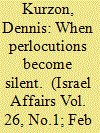| Srl | Item |
| 1 |
ID:
071627


|
|
|
|
|
| Publication |
2006.
|
| Summary/Abstract |
In 2005, party elections were held for the Malaysian Chinese Association (MCA) and Gerakan Raykat Malaysia (Gerakan, or Malaysian Peoples Movement), the two main Chinese-based political parties in the ruling Barisan Nasional (BN). These elections were unusual as the challengers for the presidency were strong candidates and the incumbents had to really fight to retain their presidency. This article argues that although party contests will not bring any real change to the political position and direction of the parties concerned, it does mean that party leaders can no longer take for granted that their positions will not be challenged. The trend among Malaysian political parties has been for the top position in a political party to be an uncontested post. This has meant that party leaders stay for long periods at the top, often more than a decade. The strong contests in the MCA and Gerakan also means that the tenure for leaders of Chinese-based political parties in Malaysia may be limited.
|
|
|
|
|
|
|
|
|
|
|
|
|
|
|
|
| 2 |
ID:
174029


|
|
|
|
|
| Summary/Abstract |
In order to stay in the limelight and be re-elected, politicians depend on their voice to persuade potential voters or party members to support them in general elections or primaries, respectively; their assertions and claims in the form of illocutionary acts also function as perlocutionary acts of persuasion. But when politicians are under criminal investigation, often for corruption in Israel and in other countries, they may silence themselves during police investigation and court hearings, thereby silencing any perlocutionary act that may emerge from their answering questions. This article will examine the case of Naomi Blumenthal, who was found guilty of bribery and obstruction of justice in 2006, and who maintained silence during the police investigation.
|
|
|
|
|
|
|
|
|
|
|
|
|
|
|
|